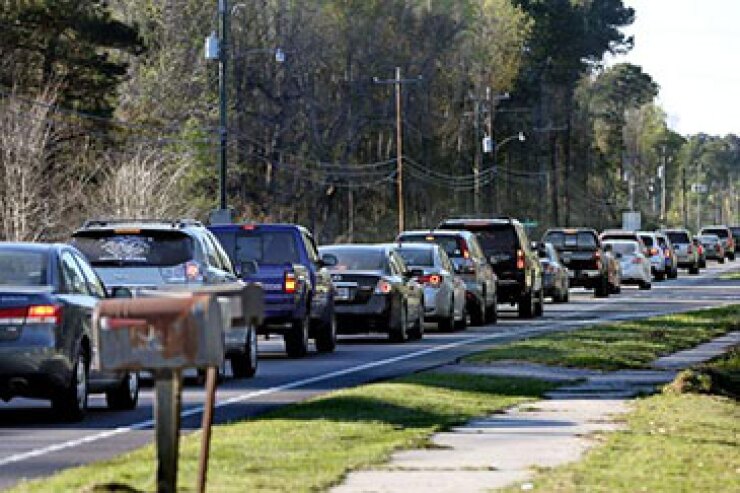
DALLAS -- Voters in Charleston County, S.C., will decide in November on a 0.5% increase in the local sales tax expected to generate $2.1 billion over the next 25 years for highways, mass transit, and bridge projects in the coastal county.
Increasing the local sales tax is necessary because the state isn't providing enough money to fix the county's transportation problems, said County Council Chairman Elliott Summey.
"This state continues to fail this community," Summey said. "That's why we're having to vote on this half-cent sales tax, not because anybody wants to raise anybody's taxes."
Councilman Henry Darby said he voted against putting the sales tax referendum on the ballot because the projects being funded should be the state's responsibility.
"We are going to tax our constituents to death. It's just tax, tax, tax," he said. "The county should not be made to do something the state should do."
If Charleston County funds the projects itself, the state will shift the money set aside for roads in the county to projects elsewhere, Darby said.
"It is not Charleston County Council's responsibility to build roads," Darby said. "It is that of the state."
The county council voted Thursday night to dedicate $600 million of the revenues to transit projects at the third and final reading of the ordinance setting the tax referendum for Nov. 8.
The tax increase is going to voters because state lawmakers failed to agree on long-term transportation funding at this year's session, said councilman Herb Sass.
"The reason we are voting for this tonight is so the public can make this decision," Sass said. "None of us are in favor of raising taxes. Unfortunately, our folks in [the state capitol of] Columbia are not getting the job done, and it's up to us."
Voters will be asked to approve the 0.5% tax increase. They will also be asked, in a separate question, whether to authorize the county to issue up to $200 million of revenue bonds if the higher tax is approved. Proceeds from the bonds would allow work to begin quickly on some of projects, officials said.
The list of projects to be funded from the tax increase originally included the completion of Interstate 526 across two islands, but the $725 million project was removed before the ballot was set.
The removal came after the South Carolina Infrastructure Bank said it would redirect $420 million of state funds set aside for the project because county leaders had not submitted a viable plan for the required $300 million local match.
The sales tax election in the coastal Carolina county is part of the more than $200 billion of transit requests in at least 30 referendums from coast to coast that will be decided at the polls in November.
The initiatives include a sales tax referendum in Los Angeles that could generate a total of $120 billion for road repair and other projects in that city, San Francisco's $3.5 billion general obligation bond request to fund Bay Area Rapid Transit projects, and Atlanta's 0.5% sales tax increase that would provide $2.4 billion for expansion of the system operated by Metropolitan Atlanta Rapid Transit Authority.
Voters in 2015 approved 24 of the 34 public transit-related ballot initiatives, according to the Center for Transportation Excellence.
The November ballot in Portland, Ore., will include a request for a new 3% sales tax on recreational marijuana that would bring in an estimated $3 million per year for street safety projects as well as drug and alcohol treatment programs. Portland is one of 70 Oregon cities asking voters for a local sales tax on recreational but not medicinal marijuana.





